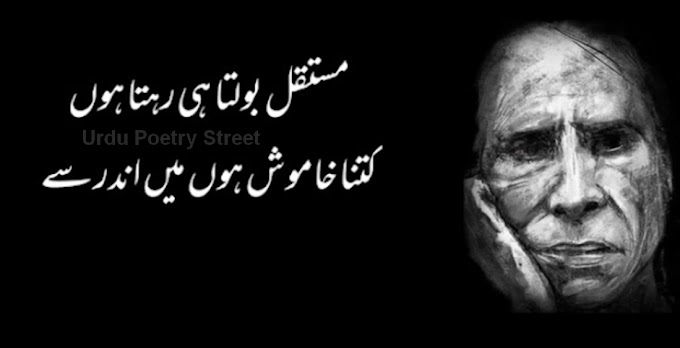Shaam se aankh men nami si hai
Aaj phir aap ki kami si hai
Dafn kar do hamen ki saans aa.e
Nabz kuchh der se thamī si hai
Kaun pathra gaya hai ankhon meñ
Barf palkon pe kyuun jami si hai
Waqt rahta nahin kahin Tik kar
Aadat is ki bhi aadmi si hai
Aaiye rsste alag kar len
Yeh zarurat bhi bahami si hai
شام سے آنکھ میں نمی سی ہے
آج پھر آپ کی کمی سی ہے
دفن کر دو ہمیں کہ سانس آئے
نبض کچھ دیر سے تھمی سی ہے
کون پتھرا گیا ہے آنکھوں میں
برف پلکوں پہ کیوں جمی سی ہے
وقت رہتا نہیں کہیں ٹک کر
عادت اس کی بھی آدمی سی ہے
آئیے راستے الگ کر لیں
یہ ضرورت بھی باہمی سی ہے
Ghazal Video Link || Voice Jagjit Singh
Jagjit Singh: The Ghazal Maestro Whose Melodies Transcend Time
In the world of Indian music, Jagjit Singh remains an unparalleled legend, revered as the "King of Ghazals" whose soul-stirring melodies have touched the hearts of millions around the globe. With his velvety voice, exquisite phrasing, and deep emotional resonance, Jagjit Singh carved a niche for himself in the realm of ghazal singing, elevating this traditional form of Urdu poetry to new heights of popularity and acclaim.
Born on February 8, 1941, in Sri Ganganagar, Rajasthan, Jagjit Singh's musical journey began at a young age. Despite facing initial resistance from his family, who preferred a more conventional career path for him, Jagjit Singh pursued his passion for music with unwavering determination and dedication. He trained under renowned classical music teachers, honing his skills in vocal technique and musical expression, and soon emerged as a rising star in the world of Indian music.
Jagjit Singh's breakthrough came in the 1970s when he burst onto the music scene with his debut album, "The Unforgettable." With its innovative fusion of traditional ghazal poetry and contemporary musical arrangements, the album captivated audiences and critics alike, establishing Jagjit Singh as a force to be reckoned with in the world of Indian music. His smooth, velvety voice and emotive singing style breathed new life into classic ghazals, enchanting listeners with his ability to convey the depth of emotion and longing inherent in the poetry.
Throughout his illustrious career, Jagjit Singh released over 80 albums, spanning a wide range of genres including ghazals, devotional songs, and film music. His collaborations with renowned poets such as Mirza Ghalib, Faiz Ahmed Faiz, and Gulzar resulted in timeless classics that continue to resonate with audiences to this day. Songs like "Hoshwalon Ko Khabar Kya," "Tum Itna Jo Muskura Rahe Ho," and "Koi Fariyaad" remain perennial favorites among fans, cherished for their evocative lyrics, haunting melodies, and timeless appeal.
One of Jagjit Singh's greatest contributions to the world of Indian music was his role in popularising ghazals among mainstream audiences. Before his emergence, ghazals were considered a niche genre, confined to literary circles and select aficionados. However, Jagjit Singh's innovative approach to music production and his ability to connect with listeners on a visceral level helped bring ghazals into the mainstream, introducing a new generation of music lovers to the beauty and depth of this traditional form of poetry.
Moreover, Jagjit Singh's influence extended beyond the realm of music, as he used his platform to advocate for social causes and promote cultural exchange. He was a staunch supporter of peace and harmony between India and Pakistan, often performing in both countries to promote cross-cultural understanding and dialogue. His commitment to philanthropy and his efforts to use music as a tool for social change earned him widespread admiration and respect, solidifying his legacy as not just a musical icon, but also a humanitarian and visionary.
Tragically, Jagjit Singh's life was cut short when he passed away on October 10, 2011, leaving behind a legacy that continues to inspire and uplift millions around the world. His music lives on as a timeless tribute to the power of love, longing, and human connection, reminding us of the enduring beauty and resonance of the ghazal tradition. As we celebrate his life and legacy, let us honor Jagjit Singh's memory by embracing the transformative power of music to unite hearts, transcend boundaries, and elevate the human spirit.










